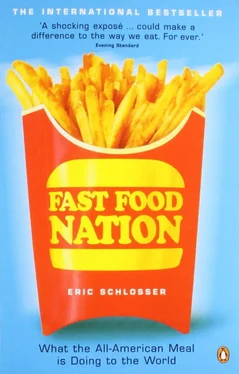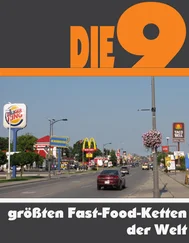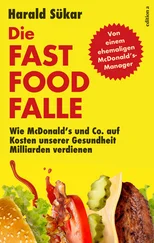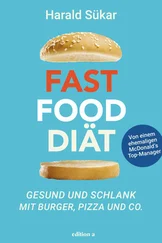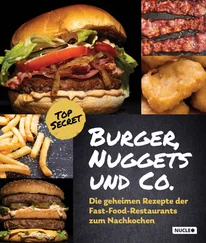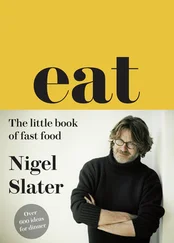Fast food is now so commonplace that it has acquired an air of inevitability, as though it were somehow unavoidable, a fact of modern life. And yet the dominance of the fast food giants was no more preordained than the march of colonial split-levels, golf courses, and man-made lakes across the deserts of the American West. The political philosophy that now prevails in so much of the West — with its demand for lower taxes, smaller government, an unbridled free market — stands in total contradiction to the region’s true economic underpinnings. No other region of the United States has been so dependent on government subsidies for so long, from the nineteenth-century construction of its railroads to the twentieth-century financing of its military bases and dams. One historian has described the federal government’s 1950s highway-building binge as a case study in “interstate socialism” — a phrase that aptly describes how the West was really won. The fast food industry took root alongside that interstate highway system, as a new form of restaurant sprang up beside the new off-ramps. Moreover, the extraordinary growth of this industry over the past quarter-century did not occur in a political vacuum. It took place during a period when the inflation-adjusted value of the minimum wage declined by about 40 percent, when sophisticated mass marketing techniques were for the first time directed at small children, and when federal agencies created to protect workers and consumers too often behaved like branch offices of the companies that were supposed to be regulated. Ever since the administration of President Richard Nixon, the fast food industry has worked closely with its allies in Congress and the white House to oppose new worker safety, food safety, and minimum wage laws. While publicly espousing support for the free market, the fast food chains have quietly pursued and greatly benefited from a wide variety of government subsidies. Far from being inevitable, America’s fast food industry in its present form is the logical outcome of certain political and economic choices.
In the potato fields and processing plants of Idaho, in the ranch-lands east of Colorado Springs, in the feedlots and slaughterhouses of the High Plains, you can see the effects of fast food on the nation’s rural life, its environment, its workers, and its health. The fast food chains now stand atop a huge food-industrial complex that has gained control of American agriculture. During the 1980s, large multinationals — such as Cargill, ConAgra, and IBP — were allowed to dominate one commodity market after another. Farmers and cattle ranchers are losing their independence, essentially becoming hired hands for the agribusiness giants or being forced off the land. Family farms are now being replaced by gigantic corporate farms with absentee owners. Rural communities are losing their middle class and becoming socially stratified, divided between a small, wealthy elite and large numbers of the working poor. Small towns that seemingly belong in a Norman Rockwell painting are being turned into rural ghettos. The hardy, independent farmers whom Thomas Jefferson considered the bedrock of American democracy are a truly vanishing breed. The United States now has more prison inmates than full-time farmers.
The fast food chains’ vast purchasing power and their demand for a uniform product have encouraged fundamental changes in how cattle are raised, slaughtered, and processed into ground beef. These changes have made meatpacking — once a highly skilled, highly paid occupation — into the most dangerous job in the United States, performed by armies of poor, transient immigrants whose injuries often go unrecorded and uncompensated. And the same meat industry practices that endanger these workers have facilitated the introduction of deadly pathogens, such as E. coli 0157:H7, into America’s hamburger meat, a food aggressively marketed to children. Again and again, efforts to prevent the sale of tainted ground beef have been thwarted by meat industry lobbyists and their allies in Congress. The federal government has the legal authority to recall a defective toaster oven or stuffed animal — but still lacks the power to recall tons of contaminated, potentially lethal meat.
I do not mean to suggest that fast food is solely responsible for every social problem now haunting the United States. In some cases (such as the malling and sprawling of the West) the fast food industry has been a catalyst and a symptom of larger economic trends. In other cases (such as the rise of franchising and the spread of obesity) fast food has played a more central role. By tracing the diverse influences of fast food I hope to shed light not only on the workings of an important industry, but also on a distinctively American way of viewing the world.
Elitists have always looked down at fast food, criticizing how it tastes and regarding it as another tacky manifestation of American popular culture. The aesthetics of fast food are of much less concern to me than its impact upon the lives of ordinary Americans, both as workers and consumers. Most of all, I am concerned about its impact on the nation’s children. Fast food is heavily marketed to children and prepared by people who are barely older than children. This is an industry that both feeds and feeds off the young. During the two years spent researching this book, I ate an enormous amount of fast food. Most of it tasted pretty good. That is one of the main reasons people buy fast food; it has been carefully designed to taste good. It’s also inexpensive and convenient. But the value meals, two-for-one deals, and free refills of soda give a distorted sense of how much fast food actually costs. The real price never appears on the menu.
The sociologist George Ritzer has attacked the fast food industry for celebrating a narrow measure of efficiency over every other human value, calling the triumph of McDonald’s “the irrationality of rationality.” Others consider the fast food industry proof of the nation’s great economic vitality, a beloved American institution that appeals overseas to millions who admire our way of life. Indeed, the values, the culture, and the industrial arrangements of our fast food nation are now being exported to the rest of the world. Fast food has joined Hollywood movies, blue jeans, and pop music as one of America’s most prominent cultural exports. Unlike other commodities, however, fast food isn’t viewed, read, played, or worn. It enters the body and becomes part of the consumer. No other industry offers, both literally and figuratively, so much insight into the nature of mass consumption.
Hundreds of millions of people buy fast food every day without giving it much thought, unaware of the subtle and not so subtle ramifications of their purchases. They rarely consider where this food came from, how it was made, what it is doing to the community around them. They just grab their tray off the counter, find a table, take a seat, unwrap the paper, and dig in. The whole experience is transitory and soon forgotten. I’ve written this book out of a belief that people should know what lies behind the shiny, happy surface of every fast food transaction. They should know what really lurks between those sesame-seed buns. As the old saying goes: You are what you eat.

1/the founding fathers
CARL N. KARCHER is one of the fast food industry’s pioneers. His career extends from the industry’s modest origins to its current hamburger hegemony. His life seems at once to be a tale by Horatio Alger, a fulfillment of the American dream, and a warning about unintended consequences. It is a fast food parable about how the industry started and where it can lead. At the heart of the story is southern California, whose cities became prototypes for the rest of the nation, whose love of the automobile changed what America looks like and what Americans eat.
Читать дальше
